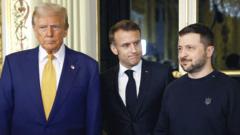Voters in Germany express deep divisions over U.S. interference in their elections, revealing concerns and support for far-right influences following a recent speech by Vice President JD Vance.
Trump’s Influence in German Elections: Divided Voter Perspectives

Trump’s Influence in German Elections: Divided Voter Perspectives
A Vice Presidential address and foreign endorsements stir mixed reactions among German voters.
In the backdrop of the recent German elections, the impact of U.S. involvement has drawn diverse responses from voters across the political spectrum. During the Munich Security Conference, Vice President JD Vance addressed European leaders, urging them to embrace political parties previously shunned as "extreme." This statement resonated differently within the electorate, particularly in the eastern city of Dresden.
Left-leaning voters expressed unease regarding Vance's remarks. Chris Buschmann, a 27-year-old voter, voiced his concern about the potential rise of right-wing populism, associating it with Germany's troubled past. “Hearing Mr. Vance made me anxious,” he said, reflecting fears of history repeating itself in a country with a notoriously dark chapter in its history.
Critics also pointed fingers at billionaire entrepreneur Elon Musk, whose recent activities in Germany included endorsing the far-right Alternative for Germany (AfD) party and speaking at their rallies. Engineer Tim Adams criticized Musk, stating that such interference was detrimental to German politics, as the endorsement of AfD, in his view, undermines democratic discourse.
On the contrary, some voters welcomed the support from the U.S. administration. Andreas Mühlbach and Anja Zeumer, who cast their ballots for the AfD, praised the influence from Trump and his advisers. Retired painter Peter Kraus echoed similar sentiments, expressing jubilation over his vote for the AfD, influenced by the two prominent American figures.
This incident underscores a complex narrative of foreign influence in elections, highlighting the division among voters in Germany — some viewing it as a dangerous encroachment on sovereignty while others see it as validation for their political beliefs. The dialogue ignited by the U.S. administration's involvement in the German elections showcases not only the polarized political landscape in Germany but also raises questions about the nature and consequences of international political endorsements.






















